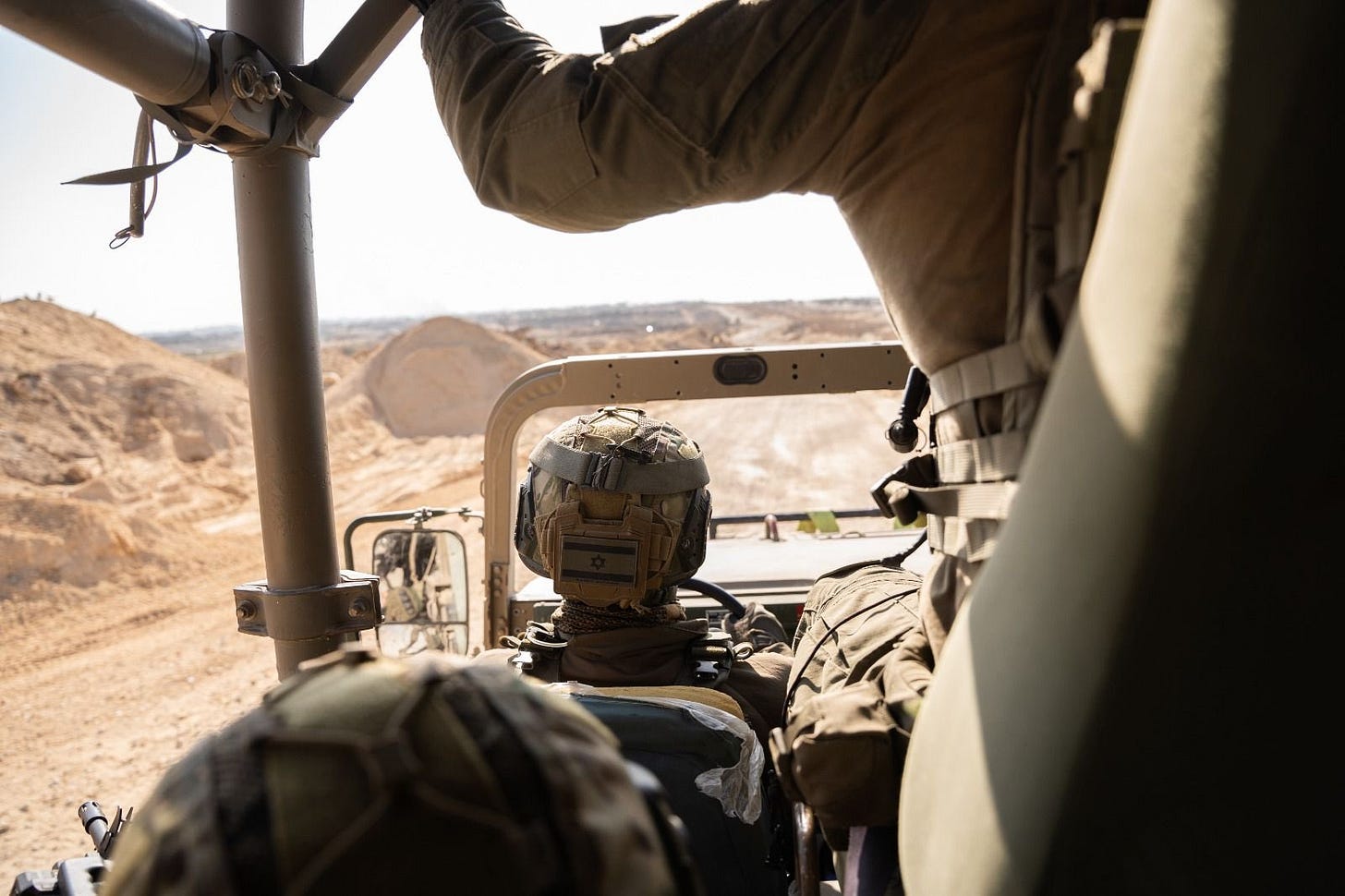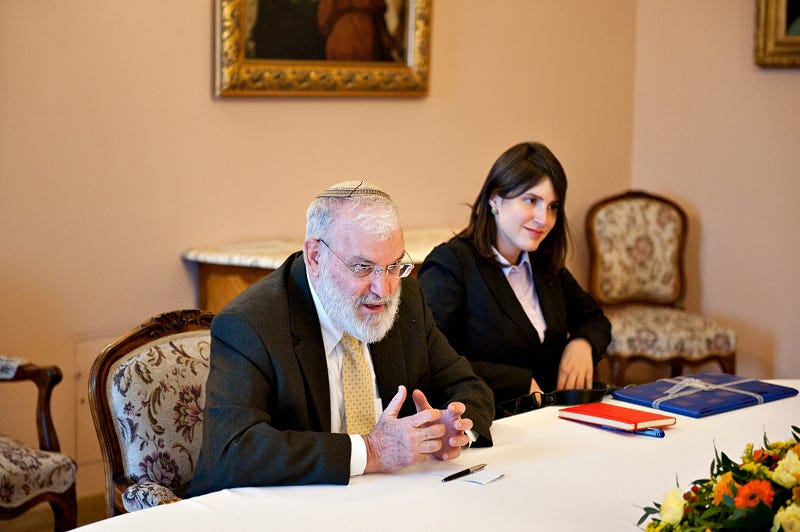Israel's Most Difficult Decision During This War
Even though Israel possesses one of the world’s best missile defense capabilities, "the damage would still be severe," exacerbated by shortages in Iron Dome interceptors following the Gaza conflict.
Please consider supporting our mission to help everyone better understand and become smarter about the Jewish world. A contribution of any amount helps us keep going.
This essay was written by Joshua Hoffman and Uriel Schachter, who received the “Exceptional Commander Award” for his service in the IDF’s prestigious 8200 intelligence unit.
You can also listen to the podcast version of this essay on Apple Podcasts, Google Podcasts, and Spotify.
Former Israeli General Yaakov Amidror, who served as head of Israel’s National Security Council and is a respected expert across the world, recently gave a lecture in Hebrew about Israel’s challenges regarding a potential war with Hezbollah in Lebanon.
As you know, Hezbollah (a terrorist organization) has been firing rockets, missiles, and “suicide drones” from Lebanon to northern Israel since the early days of this Israel-Hamas war. Both Hamas and Hezbollah are, of course, Iranian proxies. And Israel and Hezbollah fought an actual war in 2006.
The terror group’s manifesto states that its “struggle will end only when this entity Israel is obliterated. We recognize no treaty with it, no ceasefire, and no peace agreements.”1
On February 29th, at a conference held at The Argaman Institute in Jerusalem titled “The Northern Front: A Strategic Conference for the Third Lebanon War,” General Amidror spoke about the political and military objectives worthy of the State of Israel in a potential war with Hezbollah.2
According to General Amidror, on the fourth day of the war against Hamas after it led the October 7th horrors, the Israeli government had to decide whether to attack Hezbollah, since it presented a unique operational opportunity. (Again, both Hamas and Hezbollah roads ultimately lead to the Islamic Republic of Iran.)
Unusually, there was broad support for the proposed attack among different Israeli security agencies. Israel’s prime minister, Benjamin Netanyahu, with the backing of war cabinet members Benny Gantz and Gadi Eisenkot, decided against attacking Hezbollah.
General Amidror argued that even in retrospect, this decision was correct. Historical literature on two-front warfare suggests avoiding it whenever possible. Given the IDF’s uncertainty about the scope of fighting in Gaza and its lack of experience in urban warfare, General Amidror said the decision to not attack Hezbollah was even more prudent.
Hassan Nasrallah, the secretary-general of Hezbollah, decided not to join the war in Gaza. He and the Iranians were surprised by Hamas’ attack, and they were reluctant to sacrifice themselves for the Palestinians. However, Nasrallah’s decision cast a negative light on him. How could the head of the mukawama (Arabic for “resistance to Israel”) not intervene for the Palestinians?
General Amidror suggested that Nasrallah was surprised by the rapid Israeli progress in Gaza, including the quick overtaking of Gaza City and Khan Yunis. Nasrallah opted for a middle ground: avoiding war but harassing Israel on its northern border, some 250 kilometers (155 miles) from the Gaza Strip.
Initially, Nasrallah attempted to infiltrate Palestinian military squads across the border, but the IDF successfully targeted and eliminated them. Later, Nasrallah switched to using rockets, missiles (especially anti-tank missiles), and “suicide drones.”
Currently, General Amidror claimed, Hezbollah has caused significant property damage in Israel, but has not harmed Israeli military capabilities whatsoever. Nasrallah’s main achievement, according to General Amidror, is the both forced and voluntary evacuation of tens of thousands of Israelis from northern Israel, which poses a significant challenge for Israel to address.
General Amidror also explained that the current “game” between Israel and Hezbollah: Each side attacks a corresponding square in the other’s territory, escalating the scope of attacks with each move. He added that the IDF has achieved significant success in damaging Hezbollah’s military capabilities, instilling confidence in its ability to confront Hezbollah.
Additionally, the IDF has gained valuable insights into Hezbollah’s capabilities, particularly regarding the use of anti-tank missiles, which will pose a significant challenge in future conflicts.
General Amidror also outlined what the next Israel-Hezbollah war might entail. First and foremost, he emphasized that this would be a devastating war, impacting Israel’s major population centers for an extended period. Israel has limited redundancy in both military and civilian systems.
Even though Israel possesses one of the world’s best missile defense capabilities, the damage would still be severe, exacerbated by shortages in Iron Dome interceptors following the Gaza conflict.
Israelis must understand that a ground maneuver in Lebanon would be far costlier than operations in Gaza. Hezbollah’s fighters are better trained, its units more organized, and it possesses advanced weapon systems, including anti-tank missiles.
However, the IDF is better prepared for a war in Lebanon than it was for the one in Gaza, having focused on threats emanating from Israel’s northern borders for years. The IDF’s tactics, military systems, and training are tailored to this threat.
Also, General Amidror asserted that combat experience gained in Gaza has prepared fighters and commanders to make decisions under fire. This is, of course, extremely important.
General Amidror also said that, if Hezbollah believes its combat experience in Syria prepares it for war with Israel, it underestimates the scale of power it will face. Despite the war’s horrors, General Amidror concluded that the IDF is in good shape to confront it.
Therefore, General Amidror suggested that Israel first explores diplomatic solutions via the Americans and the French. He said that, despite his pessimism, Israel should let them attempt a resolution.
He also cautioned against partial military actions proposed by some in Israel, since one cannot predict whether it provokes Hezbollah into full-scale war. Israel, he clarified, should prepare itself accordingly — for a full-scale war.
What’s more, General Amidror outlined four necessary conditions for going to war:
The availability of armaments is essential. Without sufficient ammunition, war is not feasible.
Israel’s economy must be strong enough to support long-term security efforts and fund its security budget.
Achieving domestic and international legitimacy is crucial, since international support and coalition-building are necessary for Israel’s security.
The fatigue of the army must be considered. Soldiers who have fought for extended periods recently may not be ready for another lengthy conflict.
In light of these factors, General Amidror claimed that the decision whether or not to preempt another war with Hezbollah is one of the most challenging aspects of the current conflict.
“This is maybe the most difficult decision to take in this war, probably the most, whether or not to open a second front,” he said. “After all, we have to return some 80,000 people to their homes in the north.”
“An open letter, The Hizballah program.” Wikipedia.
“אלוף (מיל') יעקב עמידרור - כיצד לגשת לפעולה ישראלית בלבנון? 4 פרמטרים.” הערוץ של מכון ארגמן.




Isn't Hezbollah and its 40000 missiles (conservative estimation) actually an insurance-policy for Iran in case of an Israeli first-strike ?
There really is not much to gain for these ruffians in a direct conflict with Israel, on the contrary!
Tempting to eradicate the next dangerous and unpredictable neighbour, but I think the Israeli cabinet made the right decision.
Is it true that actually, Hezbollah is not a terrorist organization but a part of Lebanon's official military? And this classification, according to international law - amounts to Lebanon declaring war on Israel and justifies us attacking Lebanon directly; not just Hezbollah militants and their weapon stores. Please check this out because I heard it from a former Mossad director at a Zoom event hosted by Hebrew University a few months ago. Cannot remember the director's name. If this is true, why not just attack Lebanon directly, using cyber methods I'm pretty sure that Israel has access to. This would allow us to destroy a significant part of Lebanon's infrastructure without risking IDF lives; giving Lebanon a bloody nose and a deterrent to attacking us. (I heard the last war with Israel nearly bankrupted Lebanon.) Any thoughts?